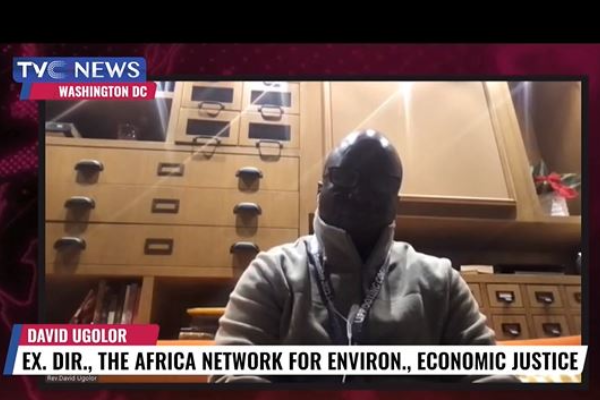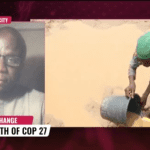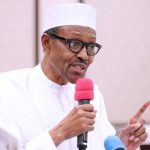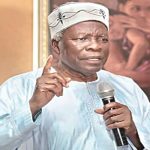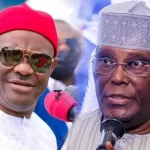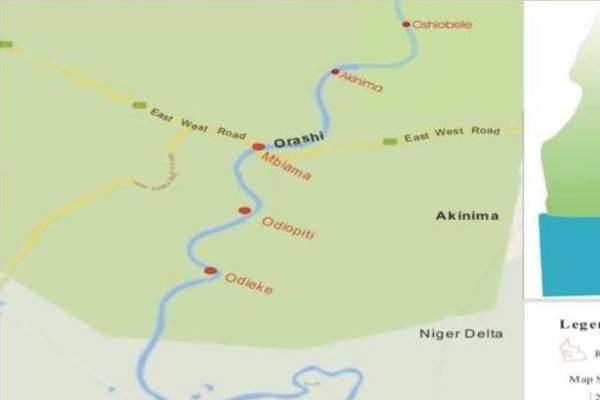World leaders, heads of financial institutions, gentlemen of the press, Civil Society Organisations and other stakeholders are in Washington DC in the United States for the 20th International Anticorruption Conference, the world’s largest independent global forum to fight corruption.
This is in commemoration of the International Anti Corruption Day.
[wonderplugin_video iframe=”https://youtu.be/Y9asPYoQKiY” lightbox=0 lightboxsize=1 lightboxwidth=960 lightboxheight=540 autoopen=0 autoopendelay=0 autoclose=0 lightboxtitle=”” lightboxgroup=”” lightboxshownavigation=0 showimage=”” lightboxoptions=”” videowidth=600 videoheight=400 keepaspectratio=1 autoplay=0 loop=0 videocss=”position:relative;display:block;background-color:#000;overflow:hidden;max-width:100%;margin:0 auto;” playbutton=”https://www.tvcnews.tv/wp-content/plugins/wonderplugin-video-embed/engine/playvideo-64-64-0.png”]
This years’ conference will focus on the theme-Approaching Corruption Defending Democratic Values, and comes at a time in which corruption poses as one of the most serious threat to achieving global development.
In Africa, Corruption has been highlighted as the bane of the continent’s development and the clock in the wheel of achieving the sustainable development goals.
In Nigeria, money stealing by former government officials are still being uncovered and repatriated into the country. To aid the recovery of stolen funds, this administration initiated a whistleblower policy that has aided it in the recovery of huge sums of sterling funds.
Former director, Africa Network for Environment and Economic Justice, David Ugolor says thousands of anti corruption activists, government officials, journalists from around the world are currently converged in Washington DC discussing different issues and trying to look for solutions to different type of corruptions, and especially with reference to the urgency that the world needs to unite Iran’s strategy and approaches that will deal with the issue of corruption and particularly against the background of increasing poverty around the world.
According to Mr Ugolor, the war going on in Ukraine has also created a big problem for the world, the energy crisis and also the need to look for a solution on how to address some of the climate change challenges that is currently affecting the international community.
He stated that there are a lot of interest from different stakeholders, Civil societies are raising questions ,and the recent Glencore Bribery corruption that have affected almost eight countries, most of them in Africa, Nigeria inclusive.
Speaking further, Mr Ugolor said this the first time in the last few, one or two years that anticorruption activists, government officials are having the opportunity to meet in person to discuss some of these issues that have been highlighted.
One of the highlights that was the suggestion by Peter Eugene, the founder of Transparency International where he talked about the issue of multi-stakeholder approach in dealing with corruption.
Nigeria is one country where the issue of multi-stakeholder could have been put in practice.
Mr Ugolor noted that a major source of income in Nigeria is from Oil and the recent corruption cases involving Glencore and some key government officials in NNPC have exposed the flaws in multi-stakeholder approach in tackling corruption in the extractive sector.
“Nigeria is one of the first countries that implemented the Extractive Industrial Transparency Initiative and Nigeria went further to put this into law by turning the AITI to the National Assembly. And we have today the Nigeria and Extractive Industry Transparency Negative Act and that makes it possible for Nigeria to put in practice the multi stakeholder approach where different stakeholders are part of the National Stakeholder Working Group.
” But unfortunately, NEITI hasn’t been able to deliver on some of these grand corruption issues, particularly with the reference to the Glencore bribery scandal that have now shown clearly in the Fact statement that key government officials in NNPCs are involved in a bribery case, and when you are filing for victim as a victim at the fine settlement in London, in the London court, this was thrown out.
“The expectation is that Nigerian government need to take an urgent step to demonstrate to the international community that those government officials that were involved in the Glencore bribery case that are currently in NNPC need to be exposed, need to be uncovered to show to the world that the Nigerian government is serious.
“The NNPC is one of the companies that signed on to the NEITI principle, but unfortunately, what we see, those principles that we sign on to, on transparency and accountability, avoiding corruption issues are not working.
“This is not very good for the credibility of the country, particularly as NEITI and NNPC will be subjected to assessment next here, and this information coming out is really bad for the country.
Speaking on why the multi-stakeholder is not working, Mr Ugolor said the way the participation of civil society in the National Stakeholder Working Group, is that it has been politicised.
“When you don’t get the civil society to participate in a credible way, you don’t expect any result from such a process.
“Lack of transparency in civil society engagement in the entire NEITI process is very damaging to the whole process, which is one of the weak point of the Nigerian Extractive Industrial Transparency Initiative.
“There’s lack of transparency. Civil society participation in the process is not very transparent and one of the biggest coalitions that is engaged in this process of risk, number of coincidence around the issues, which is an issue that needs to be tabled as we approach the assessment of NEITI next year.
Mr Ugolor also spoke about the lack of political will at the leadership level. According to him, this a real challenge Nigerians face.
“If you looked at the IMF report, you also see some of this issue of lack of political will. The lack of political will at the highest level of leadership in the country is also a very big problem.
“Resource for the anticorruption agencies to do their work is also a big problem.
“If you look at the EFCC and ICPC, they are trying to do the best they can, but they need to be resourced very well to be able to undertake intelligence investigation, unfortunately, this is a big challenge in the country.
“If the government are genuinely committed in tackling grand corruption in NNPC, those officials that were named in the Glencore Bribery case will be exposed. But if Nigerian government continue to cover them up, there is no way you will say that Nigeria is implementing a strategy industry transparency initiative in Nigeria.
World leaders, heads of financial institutions, gentlemen of the press, Civil Society Organisations and other stakeholders are in Washington DC in the United States for the 20th International Anticorruption Conference, the world’s largest independent global forum to fight corruption.
This is in commemoration of the International Anti Corruption Day.
[wonderplugin_video iframe=”https://youtu.be/Y9asPYoQKiY” lightbox=0 lightboxsize=1 lightboxwidth=960 lightboxheight=540 autoopen=0 autoopendelay=0 autoclose=0 lightboxtitle=”” lightboxgroup=”” lightboxshownavigation=0 showimage=”” lightboxoptions=”” videowidth=600 videoheight=400 keepaspectratio=1 autoplay=0 loop=0 videocss=”position:relative;display:block;background-color:#000;overflow:hidden;max-width:100%;margin:0 auto;” playbutton=”https://www.tvcnews.tv/wp-content/plugins/wonderplugin-video-embed/engine/playvideo-64-64-0.png”]
This years’ conference will focus on the theme-Approaching Corruption Defending Democratic Values, and comes at a time in which corruption poses as one of the most serious threat to achieving global development.
In Africa, Corruption has been highlighted as the bane of the continent’s development and the clock in the wheel of achieving the sustainable development goals.
In Nigeria, money stealing by former government officials are still being uncovered and repatriated into the country. To aid the recovery of stolen funds, this administration initiated a whistleblower policy that has aided it in the recovery of huge sums of sterling funds.
Former director, Africa Network for Environment and Economic Justice, David Ugolor says thousands of anti corruption activists, government officials, journalists from around the world are currently converged in Washington DC discussing different issues and trying to look for solutions to different type of corruptions, and especially with reference to the urgency that the world needs to unite Iran’s strategy and approaches that will deal with the issue of corruption and particularly against the background of increasing poverty around the world.
According to Mr Ugolor, the war going on in Ukraine has also created a big problem for the world, the energy crisis and also the need to look for a solution on how to address some of the climate change challenges that is currently affecting the international community.
He stated that there are a lot of interest from different stakeholders, Civil societies are raising questions ,and the recent Glencore Bribery corruption that have affected almost eight countries, most of them in Africa, Nigeria inclusive.
Speaking further, Mr Ugolor said this the first time in the last few, one or two years that anticorruption activists, government officials are having the opportunity to meet in person to discuss some of these issues that have been highlighted.
One of the highlights that was the suggestion by Peter Eugene, the founder of Transparency International where he talked about the issue of multi-stakeholder approach in dealing with corruption.
Nigeria is one country where the issue of multi-stakeholder could have been put in practice.
Mr Ugolor noted that a major source of income in Nigeria is from Oil and the recent corruption cases involving Glencore and some key government officials in NNPC have exposed the flaws in multi-stakeholder approach in tackling corruption in the extractive sector.
“Nigeria is one of the first countries that implemented the Extractive Industrial Transparency Initiative and Nigeria went further to put this into law by turning the AITI to the National Assembly. And we have today the Nigeria and Extractive Industry Transparency Negative Act and that makes it possible for Nigeria to put in practice the multi stakeholder approach where different stakeholders are part of the National Stakeholder Working Group.
” But unfortunately, NEITI hasn’t been able to deliver on some of these grand corruption issues, particularly with the reference to the Glencore bribery scandal that have now shown clearly in the Fact statement that key government officials in NNPCs are involved in a bribery case, and when you are filing for victim as a victim at the fine settlement in London, in the London court, this was thrown out.
“The expectation is that Nigerian government need to take an urgent step to demonstrate to the international community that those government officials that were involved in the Glencore bribery case that are currently in NNPC need to be exposed, need to be uncovered to show to the world that the Nigerian government is serious.
“The NNPC is one of the companies that signed on to the NEITI principle, but unfortunately, what we see, those principles that we sign on to, on transparency and accountability, avoiding corruption issues are not working.
“This is not very good for the credibility of the country, particularly as NEITI and NNPC will be subjected to assessment next here, and this information coming out is really bad for the country.
Speaking on why the multi-stakeholder is not working, Mr Ugolor said the way the participation of civil society in the National Stakeholder Working Group, is that it has been politicised.
“When you don’t get the civil society to participate in a credible way, you don’t expect any result from such a process.
“Lack of transparency in civil society engagement in the entire NEITI process is very damaging to the whole process, which is one of the weak point of the Nigerian Extractive Industrial Transparency Initiative.
“There’s lack of transparency. Civil society participation in the process is not very transparent and one of the biggest coalitions that is engaged in this process of risk, number of coincidence around the issues, which is an issue that needs to be tabled as we approach the assessment of NEITI next year.
Mr Ugolor also spoke about the lack of political will at the leadership level. According to him, this a real challenge Nigerians face.
“If you looked at the IMF report, you also see some of this issue of lack of political will. The lack of political will at the highest level of leadership in the country is also a very big problem.
“Resource for the anticorruption agencies to do their work is also a big problem.
“If you look at the EFCC and ICPC, they are trying to do the best they can, but they need to be resourced very well to be able to undertake intelligence investigation, unfortunately, this is a big challenge in the country.
“If the government are genuinely committed in tackling grand corruption in NNPC, those officials that were named in the Glencore Bribery case will be exposed. But if Nigerian government continue to cover them up, there is no way you will say that Nigeria is implementing a strategy industry transparency initiative in Nigeria.
World leaders, heads of financial institutions, gentlemen of the press, Civil Society Organisations and other stakeholders are in Washington DC in the United States for the 20th International Anticorruption Conference, the world’s largest independent global forum to fight corruption.
This is in commemoration of the International Anti Corruption Day.
[wonderplugin_video iframe=”https://youtu.be/Y9asPYoQKiY” lightbox=0 lightboxsize=1 lightboxwidth=960 lightboxheight=540 autoopen=0 autoopendelay=0 autoclose=0 lightboxtitle=”” lightboxgroup=”” lightboxshownavigation=0 showimage=”” lightboxoptions=”” videowidth=600 videoheight=400 keepaspectratio=1 autoplay=0 loop=0 videocss=”position:relative;display:block;background-color:#000;overflow:hidden;max-width:100%;margin:0 auto;” playbutton=”https://www.tvcnews.tv/wp-content/plugins/wonderplugin-video-embed/engine/playvideo-64-64-0.png”]
This years’ conference will focus on the theme-Approaching Corruption Defending Democratic Values, and comes at a time in which corruption poses as one of the most serious threat to achieving global development.
In Africa, Corruption has been highlighted as the bane of the continent’s development and the clock in the wheel of achieving the sustainable development goals.
In Nigeria, money stealing by former government officials are still being uncovered and repatriated into the country. To aid the recovery of stolen funds, this administration initiated a whistleblower policy that has aided it in the recovery of huge sums of sterling funds.
Former director, Africa Network for Environment and Economic Justice, David Ugolor says thousands of anti corruption activists, government officials, journalists from around the world are currently converged in Washington DC discussing different issues and trying to look for solutions to different type of corruptions, and especially with reference to the urgency that the world needs to unite Iran’s strategy and approaches that will deal with the issue of corruption and particularly against the background of increasing poverty around the world.
According to Mr Ugolor, the war going on in Ukraine has also created a big problem for the world, the energy crisis and also the need to look for a solution on how to address some of the climate change challenges that is currently affecting the international community.
He stated that there are a lot of interest from different stakeholders, Civil societies are raising questions ,and the recent Glencore Bribery corruption that have affected almost eight countries, most of them in Africa, Nigeria inclusive.
Speaking further, Mr Ugolor said this the first time in the last few, one or two years that anticorruption activists, government officials are having the opportunity to meet in person to discuss some of these issues that have been highlighted.
One of the highlights that was the suggestion by Peter Eugene, the founder of Transparency International where he talked about the issue of multi-stakeholder approach in dealing with corruption.
Nigeria is one country where the issue of multi-stakeholder could have been put in practice.
Mr Ugolor noted that a major source of income in Nigeria is from Oil and the recent corruption cases involving Glencore and some key government officials in NNPC have exposed the flaws in multi-stakeholder approach in tackling corruption in the extractive sector.
“Nigeria is one of the first countries that implemented the Extractive Industrial Transparency Initiative and Nigeria went further to put this into law by turning the AITI to the National Assembly. And we have today the Nigeria and Extractive Industry Transparency Negative Act and that makes it possible for Nigeria to put in practice the multi stakeholder approach where different stakeholders are part of the National Stakeholder Working Group.
” But unfortunately, NEITI hasn’t been able to deliver on some of these grand corruption issues, particularly with the reference to the Glencore bribery scandal that have now shown clearly in the Fact statement that key government officials in NNPCs are involved in a bribery case, and when you are filing for victim as a victim at the fine settlement in London, in the London court, this was thrown out.
“The expectation is that Nigerian government need to take an urgent step to demonstrate to the international community that those government officials that were involved in the Glencore bribery case that are currently in NNPC need to be exposed, need to be uncovered to show to the world that the Nigerian government is serious.
“The NNPC is one of the companies that signed on to the NEITI principle, but unfortunately, what we see, those principles that we sign on to, on transparency and accountability, avoiding corruption issues are not working.
“This is not very good for the credibility of the country, particularly as NEITI and NNPC will be subjected to assessment next here, and this information coming out is really bad for the country.
Speaking on why the multi-stakeholder is not working, Mr Ugolor said the way the participation of civil society in the National Stakeholder Working Group, is that it has been politicised.
“When you don’t get the civil society to participate in a credible way, you don’t expect any result from such a process.
“Lack of transparency in civil society engagement in the entire NEITI process is very damaging to the whole process, which is one of the weak point of the Nigerian Extractive Industrial Transparency Initiative.
“There’s lack of transparency. Civil society participation in the process is not very transparent and one of the biggest coalitions that is engaged in this process of risk, number of coincidence around the issues, which is an issue that needs to be tabled as we approach the assessment of NEITI next year.
Mr Ugolor also spoke about the lack of political will at the leadership level. According to him, this a real challenge Nigerians face.
“If you looked at the IMF report, you also see some of this issue of lack of political will. The lack of political will at the highest level of leadership in the country is also a very big problem.
“Resource for the anticorruption agencies to do their work is also a big problem.
“If you look at the EFCC and ICPC, they are trying to do the best they can, but they need to be resourced very well to be able to undertake intelligence investigation, unfortunately, this is a big challenge in the country.
“If the government are genuinely committed in tackling grand corruption in NNPC, those officials that were named in the Glencore Bribery case will be exposed. But if Nigerian government continue to cover them up, there is no way you will say that Nigeria is implementing a strategy industry transparency initiative in Nigeria.
World leaders, heads of financial institutions, gentlemen of the press, Civil Society Organisations and other stakeholders are in Washington DC in the United States for the 20th International Anticorruption Conference, the world’s largest independent global forum to fight corruption.
This is in commemoration of the International Anti Corruption Day.
[wonderplugin_video iframe=”https://youtu.be/Y9asPYoQKiY” lightbox=0 lightboxsize=1 lightboxwidth=960 lightboxheight=540 autoopen=0 autoopendelay=0 autoclose=0 lightboxtitle=”” lightboxgroup=”” lightboxshownavigation=0 showimage=”” lightboxoptions=”” videowidth=600 videoheight=400 keepaspectratio=1 autoplay=0 loop=0 videocss=”position:relative;display:block;background-color:#000;overflow:hidden;max-width:100%;margin:0 auto;” playbutton=”https://www.tvcnews.tv/wp-content/plugins/wonderplugin-video-embed/engine/playvideo-64-64-0.png”]
This years’ conference will focus on the theme-Approaching Corruption Defending Democratic Values, and comes at a time in which corruption poses as one of the most serious threat to achieving global development.
In Africa, Corruption has been highlighted as the bane of the continent’s development and the clock in the wheel of achieving the sustainable development goals.
In Nigeria, money stealing by former government officials are still being uncovered and repatriated into the country. To aid the recovery of stolen funds, this administration initiated a whistleblower policy that has aided it in the recovery of huge sums of sterling funds.
Former director, Africa Network for Environment and Economic Justice, David Ugolor says thousands of anti corruption activists, government officials, journalists from around the world are currently converged in Washington DC discussing different issues and trying to look for solutions to different type of corruptions, and especially with reference to the urgency that the world needs to unite Iran’s strategy and approaches that will deal with the issue of corruption and particularly against the background of increasing poverty around the world.
According to Mr Ugolor, the war going on in Ukraine has also created a big problem for the world, the energy crisis and also the need to look for a solution on how to address some of the climate change challenges that is currently affecting the international community.
He stated that there are a lot of interest from different stakeholders, Civil societies are raising questions ,and the recent Glencore Bribery corruption that have affected almost eight countries, most of them in Africa, Nigeria inclusive.
Speaking further, Mr Ugolor said this the first time in the last few, one or two years that anticorruption activists, government officials are having the opportunity to meet in person to discuss some of these issues that have been highlighted.
One of the highlights that was the suggestion by Peter Eugene, the founder of Transparency International where he talked about the issue of multi-stakeholder approach in dealing with corruption.
Nigeria is one country where the issue of multi-stakeholder could have been put in practice.
Mr Ugolor noted that a major source of income in Nigeria is from Oil and the recent corruption cases involving Glencore and some key government officials in NNPC have exposed the flaws in multi-stakeholder approach in tackling corruption in the extractive sector.
“Nigeria is one of the first countries that implemented the Extractive Industrial Transparency Initiative and Nigeria went further to put this into law by turning the AITI to the National Assembly. And we have today the Nigeria and Extractive Industry Transparency Negative Act and that makes it possible for Nigeria to put in practice the multi stakeholder approach where different stakeholders are part of the National Stakeholder Working Group.
” But unfortunately, NEITI hasn’t been able to deliver on some of these grand corruption issues, particularly with the reference to the Glencore bribery scandal that have now shown clearly in the Fact statement that key government officials in NNPCs are involved in a bribery case, and when you are filing for victim as a victim at the fine settlement in London, in the London court, this was thrown out.
“The expectation is that Nigerian government need to take an urgent step to demonstrate to the international community that those government officials that were involved in the Glencore bribery case that are currently in NNPC need to be exposed, need to be uncovered to show to the world that the Nigerian government is serious.
“The NNPC is one of the companies that signed on to the NEITI principle, but unfortunately, what we see, those principles that we sign on to, on transparency and accountability, avoiding corruption issues are not working.
“This is not very good for the credibility of the country, particularly as NEITI and NNPC will be subjected to assessment next here, and this information coming out is really bad for the country.
Speaking on why the multi-stakeholder is not working, Mr Ugolor said the way the participation of civil society in the National Stakeholder Working Group, is that it has been politicised.
“When you don’t get the civil society to participate in a credible way, you don’t expect any result from such a process.
“Lack of transparency in civil society engagement in the entire NEITI process is very damaging to the whole process, which is one of the weak point of the Nigerian Extractive Industrial Transparency Initiative.
“There’s lack of transparency. Civil society participation in the process is not very transparent and one of the biggest coalitions that is engaged in this process of risk, number of coincidence around the issues, which is an issue that needs to be tabled as we approach the assessment of NEITI next year.
Mr Ugolor also spoke about the lack of political will at the leadership level. According to him, this a real challenge Nigerians face.
“If you looked at the IMF report, you also see some of this issue of lack of political will. The lack of political will at the highest level of leadership in the country is also a very big problem.
“Resource for the anticorruption agencies to do their work is also a big problem.
“If you look at the EFCC and ICPC, they are trying to do the best they can, but they need to be resourced very well to be able to undertake intelligence investigation, unfortunately, this is a big challenge in the country.
“If the government are genuinely committed in tackling grand corruption in NNPC, those officials that were named in the Glencore Bribery case will be exposed. But if Nigerian government continue to cover them up, there is no way you will say that Nigeria is implementing a strategy industry transparency initiative in Nigeria.
World leaders, heads of financial institutions, gentlemen of the press, Civil Society Organisations and other stakeholders are in Washington DC in the United States for the 20th International Anticorruption Conference, the world’s largest independent global forum to fight corruption.
This is in commemoration of the International Anti Corruption Day.
[wonderplugin_video iframe=”https://youtu.be/Y9asPYoQKiY” lightbox=0 lightboxsize=1 lightboxwidth=960 lightboxheight=540 autoopen=0 autoopendelay=0 autoclose=0 lightboxtitle=”” lightboxgroup=”” lightboxshownavigation=0 showimage=”” lightboxoptions=”” videowidth=600 videoheight=400 keepaspectratio=1 autoplay=0 loop=0 videocss=”position:relative;display:block;background-color:#000;overflow:hidden;max-width:100%;margin:0 auto;” playbutton=”https://www.tvcnews.tv/wp-content/plugins/wonderplugin-video-embed/engine/playvideo-64-64-0.png”]
This years’ conference will focus on the theme-Approaching Corruption Defending Democratic Values, and comes at a time in which corruption poses as one of the most serious threat to achieving global development.
In Africa, Corruption has been highlighted as the bane of the continent’s development and the clock in the wheel of achieving the sustainable development goals.
In Nigeria, money stealing by former government officials are still being uncovered and repatriated into the country. To aid the recovery of stolen funds, this administration initiated a whistleblower policy that has aided it in the recovery of huge sums of sterling funds.
Former director, Africa Network for Environment and Economic Justice, David Ugolor says thousands of anti corruption activists, government officials, journalists from around the world are currently converged in Washington DC discussing different issues and trying to look for solutions to different type of corruptions, and especially with reference to the urgency that the world needs to unite Iran’s strategy and approaches that will deal with the issue of corruption and particularly against the background of increasing poverty around the world.
According to Mr Ugolor, the war going on in Ukraine has also created a big problem for the world, the energy crisis and also the need to look for a solution on how to address some of the climate change challenges that is currently affecting the international community.
He stated that there are a lot of interest from different stakeholders, Civil societies are raising questions ,and the recent Glencore Bribery corruption that have affected almost eight countries, most of them in Africa, Nigeria inclusive.
Speaking further, Mr Ugolor said this the first time in the last few, one or two years that anticorruption activists, government officials are having the opportunity to meet in person to discuss some of these issues that have been highlighted.
One of the highlights that was the suggestion by Peter Eugene, the founder of Transparency International where he talked about the issue of multi-stakeholder approach in dealing with corruption.
Nigeria is one country where the issue of multi-stakeholder could have been put in practice.
Mr Ugolor noted that a major source of income in Nigeria is from Oil and the recent corruption cases involving Glencore and some key government officials in NNPC have exposed the flaws in multi-stakeholder approach in tackling corruption in the extractive sector.
“Nigeria is one of the first countries that implemented the Extractive Industrial Transparency Initiative and Nigeria went further to put this into law by turning the AITI to the National Assembly. And we have today the Nigeria and Extractive Industry Transparency Negative Act and that makes it possible for Nigeria to put in practice the multi stakeholder approach where different stakeholders are part of the National Stakeholder Working Group.
” But unfortunately, NEITI hasn’t been able to deliver on some of these grand corruption issues, particularly with the reference to the Glencore bribery scandal that have now shown clearly in the Fact statement that key government officials in NNPCs are involved in a bribery case, and when you are filing for victim as a victim at the fine settlement in London, in the London court, this was thrown out.
“The expectation is that Nigerian government need to take an urgent step to demonstrate to the international community that those government officials that were involved in the Glencore bribery case that are currently in NNPC need to be exposed, need to be uncovered to show to the world that the Nigerian government is serious.
“The NNPC is one of the companies that signed on to the NEITI principle, but unfortunately, what we see, those principles that we sign on to, on transparency and accountability, avoiding corruption issues are not working.
“This is not very good for the credibility of the country, particularly as NEITI and NNPC will be subjected to assessment next here, and this information coming out is really bad for the country.
Speaking on why the multi-stakeholder is not working, Mr Ugolor said the way the participation of civil society in the National Stakeholder Working Group, is that it has been politicised.
“When you don’t get the civil society to participate in a credible way, you don’t expect any result from such a process.
“Lack of transparency in civil society engagement in the entire NEITI process is very damaging to the whole process, which is one of the weak point of the Nigerian Extractive Industrial Transparency Initiative.
“There’s lack of transparency. Civil society participation in the process is not very transparent and one of the biggest coalitions that is engaged in this process of risk, number of coincidence around the issues, which is an issue that needs to be tabled as we approach the assessment of NEITI next year.
Mr Ugolor also spoke about the lack of political will at the leadership level. According to him, this a real challenge Nigerians face.
“If you looked at the IMF report, you also see some of this issue of lack of political will. The lack of political will at the highest level of leadership in the country is also a very big problem.
“Resource for the anticorruption agencies to do their work is also a big problem.
“If you look at the EFCC and ICPC, they are trying to do the best they can, but they need to be resourced very well to be able to undertake intelligence investigation, unfortunately, this is a big challenge in the country.
“If the government are genuinely committed in tackling grand corruption in NNPC, those officials that were named in the Glencore Bribery case will be exposed. But if Nigerian government continue to cover them up, there is no way you will say that Nigeria is implementing a strategy industry transparency initiative in Nigeria.
World leaders, heads of financial institutions, gentlemen of the press, Civil Society Organisations and other stakeholders are in Washington DC in the United States for the 20th International Anticorruption Conference, the world’s largest independent global forum to fight corruption.
This is in commemoration of the International Anti Corruption Day.
[wonderplugin_video iframe=”https://youtu.be/Y9asPYoQKiY” lightbox=0 lightboxsize=1 lightboxwidth=960 lightboxheight=540 autoopen=0 autoopendelay=0 autoclose=0 lightboxtitle=”” lightboxgroup=”” lightboxshownavigation=0 showimage=”” lightboxoptions=”” videowidth=600 videoheight=400 keepaspectratio=1 autoplay=0 loop=0 videocss=”position:relative;display:block;background-color:#000;overflow:hidden;max-width:100%;margin:0 auto;” playbutton=”https://www.tvcnews.tv/wp-content/plugins/wonderplugin-video-embed/engine/playvideo-64-64-0.png”]
This years’ conference will focus on the theme-Approaching Corruption Defending Democratic Values, and comes at a time in which corruption poses as one of the most serious threat to achieving global development.
In Africa, Corruption has been highlighted as the bane of the continent’s development and the clock in the wheel of achieving the sustainable development goals.
In Nigeria, money stealing by former government officials are still being uncovered and repatriated into the country. To aid the recovery of stolen funds, this administration initiated a whistleblower policy that has aided it in the recovery of huge sums of sterling funds.
Former director, Africa Network for Environment and Economic Justice, David Ugolor says thousands of anti corruption activists, government officials, journalists from around the world are currently converged in Washington DC discussing different issues and trying to look for solutions to different type of corruptions, and especially with reference to the urgency that the world needs to unite Iran’s strategy and approaches that will deal with the issue of corruption and particularly against the background of increasing poverty around the world.
According to Mr Ugolor, the war going on in Ukraine has also created a big problem for the world, the energy crisis and also the need to look for a solution on how to address some of the climate change challenges that is currently affecting the international community.
He stated that there are a lot of interest from different stakeholders, Civil societies are raising questions ,and the recent Glencore Bribery corruption that have affected almost eight countries, most of them in Africa, Nigeria inclusive.
Speaking further, Mr Ugolor said this the first time in the last few, one or two years that anticorruption activists, government officials are having the opportunity to meet in person to discuss some of these issues that have been highlighted.
One of the highlights that was the suggestion by Peter Eugene, the founder of Transparency International where he talked about the issue of multi-stakeholder approach in dealing with corruption.
Nigeria is one country where the issue of multi-stakeholder could have been put in practice.
Mr Ugolor noted that a major source of income in Nigeria is from Oil and the recent corruption cases involving Glencore and some key government officials in NNPC have exposed the flaws in multi-stakeholder approach in tackling corruption in the extractive sector.
“Nigeria is one of the first countries that implemented the Extractive Industrial Transparency Initiative and Nigeria went further to put this into law by turning the AITI to the National Assembly. And we have today the Nigeria and Extractive Industry Transparency Negative Act and that makes it possible for Nigeria to put in practice the multi stakeholder approach where different stakeholders are part of the National Stakeholder Working Group.
” But unfortunately, NEITI hasn’t been able to deliver on some of these grand corruption issues, particularly with the reference to the Glencore bribery scandal that have now shown clearly in the Fact statement that key government officials in NNPCs are involved in a bribery case, and when you are filing for victim as a victim at the fine settlement in London, in the London court, this was thrown out.
“The expectation is that Nigerian government need to take an urgent step to demonstrate to the international community that those government officials that were involved in the Glencore bribery case that are currently in NNPC need to be exposed, need to be uncovered to show to the world that the Nigerian government is serious.
“The NNPC is one of the companies that signed on to the NEITI principle, but unfortunately, what we see, those principles that we sign on to, on transparency and accountability, avoiding corruption issues are not working.
“This is not very good for the credibility of the country, particularly as NEITI and NNPC will be subjected to assessment next here, and this information coming out is really bad for the country.
Speaking on why the multi-stakeholder is not working, Mr Ugolor said the way the participation of civil society in the National Stakeholder Working Group, is that it has been politicised.
“When you don’t get the civil society to participate in a credible way, you don’t expect any result from such a process.
“Lack of transparency in civil society engagement in the entire NEITI process is very damaging to the whole process, which is one of the weak point of the Nigerian Extractive Industrial Transparency Initiative.
“There’s lack of transparency. Civil society participation in the process is not very transparent and one of the biggest coalitions that is engaged in this process of risk, number of coincidence around the issues, which is an issue that needs to be tabled as we approach the assessment of NEITI next year.
Mr Ugolor also spoke about the lack of political will at the leadership level. According to him, this a real challenge Nigerians face.
“If you looked at the IMF report, you also see some of this issue of lack of political will. The lack of political will at the highest level of leadership in the country is also a very big problem.
“Resource for the anticorruption agencies to do their work is also a big problem.
“If you look at the EFCC and ICPC, they are trying to do the best they can, but they need to be resourced very well to be able to undertake intelligence investigation, unfortunately, this is a big challenge in the country.
“If the government are genuinely committed in tackling grand corruption in NNPC, those officials that were named in the Glencore Bribery case will be exposed. But if Nigerian government continue to cover them up, there is no way you will say that Nigeria is implementing a strategy industry transparency initiative in Nigeria.
World leaders, heads of financial institutions, gentlemen of the press, Civil Society Organisations and other stakeholders are in Washington DC in the United States for the 20th International Anticorruption Conference, the world’s largest independent global forum to fight corruption.
This is in commemoration of the International Anti Corruption Day.
[wonderplugin_video iframe=”https://youtu.be/Y9asPYoQKiY” lightbox=0 lightboxsize=1 lightboxwidth=960 lightboxheight=540 autoopen=0 autoopendelay=0 autoclose=0 lightboxtitle=”” lightboxgroup=”” lightboxshownavigation=0 showimage=”” lightboxoptions=”” videowidth=600 videoheight=400 keepaspectratio=1 autoplay=0 loop=0 videocss=”position:relative;display:block;background-color:#000;overflow:hidden;max-width:100%;margin:0 auto;” playbutton=”https://www.tvcnews.tv/wp-content/plugins/wonderplugin-video-embed/engine/playvideo-64-64-0.png”]
This years’ conference will focus on the theme-Approaching Corruption Defending Democratic Values, and comes at a time in which corruption poses as one of the most serious threat to achieving global development.
In Africa, Corruption has been highlighted as the bane of the continent’s development and the clock in the wheel of achieving the sustainable development goals.
In Nigeria, money stealing by former government officials are still being uncovered and repatriated into the country. To aid the recovery of stolen funds, this administration initiated a whistleblower policy that has aided it in the recovery of huge sums of sterling funds.
Former director, Africa Network for Environment and Economic Justice, David Ugolor says thousands of anti corruption activists, government officials, journalists from around the world are currently converged in Washington DC discussing different issues and trying to look for solutions to different type of corruptions, and especially with reference to the urgency that the world needs to unite Iran’s strategy and approaches that will deal with the issue of corruption and particularly against the background of increasing poverty around the world.
According to Mr Ugolor, the war going on in Ukraine has also created a big problem for the world, the energy crisis and also the need to look for a solution on how to address some of the climate change challenges that is currently affecting the international community.
He stated that there are a lot of interest from different stakeholders, Civil societies are raising questions ,and the recent Glencore Bribery corruption that have affected almost eight countries, most of them in Africa, Nigeria inclusive.
Speaking further, Mr Ugolor said this the first time in the last few, one or two years that anticorruption activists, government officials are having the opportunity to meet in person to discuss some of these issues that have been highlighted.
One of the highlights that was the suggestion by Peter Eugene, the founder of Transparency International where he talked about the issue of multi-stakeholder approach in dealing with corruption.
Nigeria is one country where the issue of multi-stakeholder could have been put in practice.
Mr Ugolor noted that a major source of income in Nigeria is from Oil and the recent corruption cases involving Glencore and some key government officials in NNPC have exposed the flaws in multi-stakeholder approach in tackling corruption in the extractive sector.
“Nigeria is one of the first countries that implemented the Extractive Industrial Transparency Initiative and Nigeria went further to put this into law by turning the AITI to the National Assembly. And we have today the Nigeria and Extractive Industry Transparency Negative Act and that makes it possible for Nigeria to put in practice the multi stakeholder approach where different stakeholders are part of the National Stakeholder Working Group.
” But unfortunately, NEITI hasn’t been able to deliver on some of these grand corruption issues, particularly with the reference to the Glencore bribery scandal that have now shown clearly in the Fact statement that key government officials in NNPCs are involved in a bribery case, and when you are filing for victim as a victim at the fine settlement in London, in the London court, this was thrown out.
“The expectation is that Nigerian government need to take an urgent step to demonstrate to the international community that those government officials that were involved in the Glencore bribery case that are currently in NNPC need to be exposed, need to be uncovered to show to the world that the Nigerian government is serious.
“The NNPC is one of the companies that signed on to the NEITI principle, but unfortunately, what we see, those principles that we sign on to, on transparency and accountability, avoiding corruption issues are not working.
“This is not very good for the credibility of the country, particularly as NEITI and NNPC will be subjected to assessment next here, and this information coming out is really bad for the country.
Speaking on why the multi-stakeholder is not working, Mr Ugolor said the way the participation of civil society in the National Stakeholder Working Group, is that it has been politicised.
“When you don’t get the civil society to participate in a credible way, you don’t expect any result from such a process.
“Lack of transparency in civil society engagement in the entire NEITI process is very damaging to the whole process, which is one of the weak point of the Nigerian Extractive Industrial Transparency Initiative.
“There’s lack of transparency. Civil society participation in the process is not very transparent and one of the biggest coalitions that is engaged in this process of risk, number of coincidence around the issues, which is an issue that needs to be tabled as we approach the assessment of NEITI next year.
Mr Ugolor also spoke about the lack of political will at the leadership level. According to him, this a real challenge Nigerians face.
“If you looked at the IMF report, you also see some of this issue of lack of political will. The lack of political will at the highest level of leadership in the country is also a very big problem.
“Resource for the anticorruption agencies to do their work is also a big problem.
“If you look at the EFCC and ICPC, they are trying to do the best they can, but they need to be resourced very well to be able to undertake intelligence investigation, unfortunately, this is a big challenge in the country.
“If the government are genuinely committed in tackling grand corruption in NNPC, those officials that were named in the Glencore Bribery case will be exposed. But if Nigerian government continue to cover them up, there is no way you will say that Nigeria is implementing a strategy industry transparency initiative in Nigeria.
World leaders, heads of financial institutions, gentlemen of the press, Civil Society Organisations and other stakeholders are in Washington DC in the United States for the 20th International Anticorruption Conference, the world’s largest independent global forum to fight corruption.
This is in commemoration of the International Anti Corruption Day.
[wonderplugin_video iframe=”https://youtu.be/Y9asPYoQKiY” lightbox=0 lightboxsize=1 lightboxwidth=960 lightboxheight=540 autoopen=0 autoopendelay=0 autoclose=0 lightboxtitle=”” lightboxgroup=”” lightboxshownavigation=0 showimage=”” lightboxoptions=”” videowidth=600 videoheight=400 keepaspectratio=1 autoplay=0 loop=0 videocss=”position:relative;display:block;background-color:#000;overflow:hidden;max-width:100%;margin:0 auto;” playbutton=”https://www.tvcnews.tv/wp-content/plugins/wonderplugin-video-embed/engine/playvideo-64-64-0.png”]
This years’ conference will focus on the theme-Approaching Corruption Defending Democratic Values, and comes at a time in which corruption poses as one of the most serious threat to achieving global development.
In Africa, Corruption has been highlighted as the bane of the continent’s development and the clock in the wheel of achieving the sustainable development goals.
In Nigeria, money stealing by former government officials are still being uncovered and repatriated into the country. To aid the recovery of stolen funds, this administration initiated a whistleblower policy that has aided it in the recovery of huge sums of sterling funds.
Former director, Africa Network for Environment and Economic Justice, David Ugolor says thousands of anti corruption activists, government officials, journalists from around the world are currently converged in Washington DC discussing different issues and trying to look for solutions to different type of corruptions, and especially with reference to the urgency that the world needs to unite Iran’s strategy and approaches that will deal with the issue of corruption and particularly against the background of increasing poverty around the world.
According to Mr Ugolor, the war going on in Ukraine has also created a big problem for the world, the energy crisis and also the need to look for a solution on how to address some of the climate change challenges that is currently affecting the international community.
He stated that there are a lot of interest from different stakeholders, Civil societies are raising questions ,and the recent Glencore Bribery corruption that have affected almost eight countries, most of them in Africa, Nigeria inclusive.
Speaking further, Mr Ugolor said this the first time in the last few, one or two years that anticorruption activists, government officials are having the opportunity to meet in person to discuss some of these issues that have been highlighted.
One of the highlights that was the suggestion by Peter Eugene, the founder of Transparency International where he talked about the issue of multi-stakeholder approach in dealing with corruption.
Nigeria is one country where the issue of multi-stakeholder could have been put in practice.
Mr Ugolor noted that a major source of income in Nigeria is from Oil and the recent corruption cases involving Glencore and some key government officials in NNPC have exposed the flaws in multi-stakeholder approach in tackling corruption in the extractive sector.
“Nigeria is one of the first countries that implemented the Extractive Industrial Transparency Initiative and Nigeria went further to put this into law by turning the AITI to the National Assembly. And we have today the Nigeria and Extractive Industry Transparency Negative Act and that makes it possible for Nigeria to put in practice the multi stakeholder approach where different stakeholders are part of the National Stakeholder Working Group.
” But unfortunately, NEITI hasn’t been able to deliver on some of these grand corruption issues, particularly with the reference to the Glencore bribery scandal that have now shown clearly in the Fact statement that key government officials in NNPCs are involved in a bribery case, and when you are filing for victim as a victim at the fine settlement in London, in the London court, this was thrown out.
“The expectation is that Nigerian government need to take an urgent step to demonstrate to the international community that those government officials that were involved in the Glencore bribery case that are currently in NNPC need to be exposed, need to be uncovered to show to the world that the Nigerian government is serious.
“The NNPC is one of the companies that signed on to the NEITI principle, but unfortunately, what we see, those principles that we sign on to, on transparency and accountability, avoiding corruption issues are not working.
“This is not very good for the credibility of the country, particularly as NEITI and NNPC will be subjected to assessment next here, and this information coming out is really bad for the country.
Speaking on why the multi-stakeholder is not working, Mr Ugolor said the way the participation of civil society in the National Stakeholder Working Group, is that it has been politicised.
“When you don’t get the civil society to participate in a credible way, you don’t expect any result from such a process.
“Lack of transparency in civil society engagement in the entire NEITI process is very damaging to the whole process, which is one of the weak point of the Nigerian Extractive Industrial Transparency Initiative.
“There’s lack of transparency. Civil society participation in the process is not very transparent and one of the biggest coalitions that is engaged in this process of risk, number of coincidence around the issues, which is an issue that needs to be tabled as we approach the assessment of NEITI next year.
Mr Ugolor also spoke about the lack of political will at the leadership level. According to him, this a real challenge Nigerians face.
“If you looked at the IMF report, you also see some of this issue of lack of political will. The lack of political will at the highest level of leadership in the country is also a very big problem.
“Resource for the anticorruption agencies to do their work is also a big problem.
“If you look at the EFCC and ICPC, they are trying to do the best they can, but they need to be resourced very well to be able to undertake intelligence investigation, unfortunately, this is a big challenge in the country.
“If the government are genuinely committed in tackling grand corruption in NNPC, those officials that were named in the Glencore Bribery case will be exposed. But if Nigerian government continue to cover them up, there is no way you will say that Nigeria is implementing a strategy industry transparency initiative in Nigeria.

